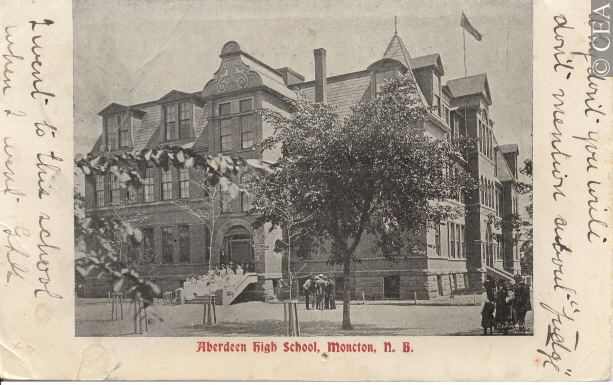Vintage postcard of Aberdeen High School, Moncton
John Wesley, the founder of Methodism, died on this date in 1791 (born 1703).
John Ayre in his biography provides this now famous anecdote of the young school boy’s first epiphany. In Frye’s words, he was
walking along St. George St. to high school and just suddenly the whole shitty and smelly garment (of fundamental teaching I had all my life) just dropped off into the sewers and stayed there. It was like the Bunyan feeling, about the burden of sin falling off his back only with me it was a burden of anxiety. Anything might have touched it off, but I don’t know what specifically did, or if anything did. I just remember that suddenly that that was no longer a part of me and never would again. (44)


Perhaps an even more apropos selection for the day comes from the beginning of The Double Vision:
“In Methodism, even of the episcopal variety to which my family belonged, there was an emphasis on religious experience as distinct from doctrine and on very early exposure to the story element in the Bible. Such a conditioning may have helped to propel me in the direction of a literary criticism that has kept revolving around the Bible, not as a source of doctrine but as a source of story and vision. It may be of interest to explain what effect I think this has had on my general point of view on the world today, apart from the peculiar features of what I have written.” (CW 4.167)
Thanks for the corrective, Matthew. I’d intended the quote I cited to highlight the kind of renewed and liberated faith Frye discovered once the burden of fundamentalist anxiety had been lifted. I’ve always treasured that story for that reason — not because something had been abandoned, but because something was being returned.
I’ve always read that passage in Ayre in a similar way: as describing an epiphany, and indeed a theophany that shapes and makes possible the reading and approach to the Bible that Frye espouses, and his own vocation as God’s undercover man at University…
Today’s the sort of day that leaves me hotly anticipating the index volume to the CW project. Two more brief bits that I found in a quick glance:
from Notebook 46 [51]: “The combination of the Methodist emphasis on the experience rather than doctrine and reading the Biblical myths and metaphors at first hand brought me as close as one can normally come to that ‘Biblical theology’ so many clergymen maintain they have.” (CW 6.697) [I don’t find myself maintaining that about myself! Hopefully not too worrisome…]
from the 1949 diary: “Stayed home & decided to hell with it–I mean correspondence & Forum editorials & such. I’m a Methodist; I hate taking time from the Lord’s work. The Lord’s work for me is sitting still in a comfortable chair thinking beautiful thoughts, & occasionally writing them down. This also happens to be what I like to do, which just shows you how wise the Lord is. …” (8.124)
You’re right, Matthew. Those are the better quotes. Thanks so much for finding them.
The quote from the 1949 diary is gorgeous, and one I find particularly appropriate, given that the church-affiliated school I work with here in Mondoville spends a fair amount of time worrying about just that sort of thing. Consider this one linked.